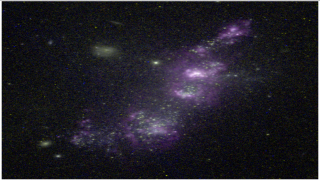Bibcode
Hwang, Hsiang-Chih; Barrera-Ballesteros, Jorge K.; Heckman, Timothy M.; Rowlands, Kate; Lin, Lihwai; Rodriguez-Gomez, Vicente; Pan, Hsi-An; Hsieh, Bau-Ching; Sánchez, Sebastian; Bizyaev, Dmitry; Sánchez Almeida, J.; Thilker, David A.; Lotz, Jennifer M.; Jones, Amy; Nair, Preethi; Andrews, Brett H.; Drory, Niv
Referencia bibliográfica
The Astrophysical Journal, Volume 872, Issue 2, article id. 144, 22 pp. (2019).
Fecha de publicación:
2
2019
Revista
Número de citas
52
Número de citas referidas
49
Descripción
We use data from 1222 late-type star-forming galaxies in the SDSS IV
Mapping Nearby Galaxies at Apache Point Observatory survey to identify
regions in which the gas-phase metallicity is anomalously low compared
to expectations from the tight empirical relation between metallicity
and stellar surface mass density at a given stellar mass. We find
anomalously low-metallicity (ALM) gas in 10% of the star-forming spaxels
and in 25% of the galaxies in the sample. The incidence rate of ALM gas
increases strongly with both global and local measures of the specific
star formation rate and is higher in lower mass galaxies and in the
outer regions of galaxies. The incidence rate is also significantly
higher in morphologically disturbed galaxies. We estimate that the
lifetimes of the ALM regions are a few hundred Myr. We argue that the
ALM gas has been delivered to its present location by a combination of
interactions, mergers, and accretion from the halo, and that this
infusion of gas stimulates star formation. Given the estimated lifetime
and duty cycle of such events, we estimate that the time-averaged
accretion rate of ALM gas is similar to the star formation rate in
late-type galaxies over the mass range {M}* ∼
{10}9–1010 M ⊙.
Proyectos relacionados

Grupo de Estudios de Formación Estelar GEFE
El proyecto interno GEFE está enmarcado en el proyecto coordinado, ESTALLIDOS, financiado por el plan nacional desde el año 2001. El ultimo proyecto aprobado es ESTALLIDOS 6.0 (AYA2016- 79724-C4-2-P). En el proyecto GEFE trabajamos en base al caso científico del proyecto ESTALLIDOS 6.0. Los estallidos de formación estelar (Starbursts o SB) son
Casiana
Muñoz Tuñón